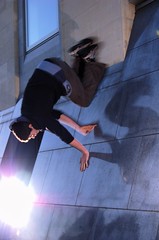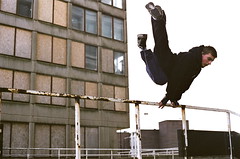Free Running or Parkour or Urban Exploration???
I must say, I'm developing a soft spot for Parkour...
...or is it Free Running... or Urban Exploration?
Well it's time for me to get my definitions straight, and I did, here's a quick synopsis (excerpts from Wikipedia) with a small conclusion at the end:
Parkour (sometimes abbreviated to PK) or l'art du déplacement[1] (English: the art of displacement) is an activity of French origin, the aim of which is to move from point A to point B as efficiently and quickly as possible, using principally the abilities of the human body.[2][3] It is meant to help one overcome obstacles, which can be anything in the surrounding environment — from branches and rocks to rails and concrete walls — and can be practiced in both rural and urban areas. Male parkour practitioners are recognized as traceurs and female as traceuses.[4]
Parkour is also known to have an influence on practitioner's thought process. Traceurs and traceuses experience a change in their critical thinking skills to help them overcome obstacles in everyday life, whether they be physical or mental boundaries.David Belle was introduced to the obstacle course training as well as Hébert's methode naturelle by his father, Raymond Belle, a French soldier who practiced the two disciplines. David Belle had participated in activities such as martial arts and gymnastics, and sought to apply his athletic prowess in a manner that would have practical use in life.
Understand that this art has been created by few soldiers in Vietnam to escape or reach: and this is the spirit I'd like parkour to keep. You have to make the difference between what is useful and what is not in emergency situations. Then you'll know what is parkour and what is not. So if you do acrobatics things on the street with no other goal than showing off, please don't say it's parkour. Acrobatics existed long time ago before parkour.

Founded by Sébastien Foucan and inspired by the similar art of displacement (parkour) which was founded by Foucan's childhood friend David Belle, free running embraces elements of tricking and street stunts,[citation needed] which are considered by the parkour community to be inefficient and not parkour. Initially, the term free running was used interchangeably with parkour. However, as free runners became interested in aesthetics as well as useful movement, the two became different disciplines.
The conflict between free running and parkour occurred when the founder of parkour, David Belle and his colleague Sébastien Foucan included, split up and went their separate ways. David Belle mainly stuck to parkour as efficiency while Sébastien Foucan focused on the freedom of movement, self-development and aesthetic aspects of parkour thus making free running more popular. Although both activities may be defined differently, still there is a lot of discussion on what is free running and confusion in its definition.
Experienced free runner Jerome Ben Aoues explains in the documentary Jump London that:[24]
"The most important element is the harmony between you and the obstacle; the movement has to be elegant... If you manage to pass over the fence elegantly — that's beautiful, rather than saying I jumped the lot. What's the point in that?"
Ventures into abandoned structures are perhaps the most common example of urban exploration. Abandoned sites are generally entered first by locals, and often sport large amounts of graffiti and acts of vandalism. Explorers face various risks in abandoned structures including collapsing roofs and floors, broken glass, guard dogs, the presence of chemicals, other harmful substances, most notably asbestos, hostile squatters and sometimes motion detectors.
The common, but not always entirely accurate catchphrase for this ethical standpoint is the Sierra Club's motto: "take nothing but pictures, leave nothing but footprints." Some try and adhere to this motto which frowns heavily upon theft, vandalism, tagging, graffiti, and any other crime except for trespassing.
Conclusion:
While the lines that divide these various practices are blurry, at best, there is still enough difference that they can be separated in our vocabulary :).
Each one is undeniably cool, but I can't help but feel that both Parkour and Urban Exploration are just a bit on the "shady" side. Free Running is the only one out of the three that can be most convincingly referred to as a sport.
Free Running is also much more recreational in its intent and is highly creative, therefore much more interesting to me (if only I can get into some decent shape...).
But I can definitely see the allure of Parkour's efficiency, knowing that you are capable of getting to or away from difficult to reach locations in a rapid manner that is likely only possible with mastery of the human body.
Yeah... it's cool.







No comments:
Post a Comment